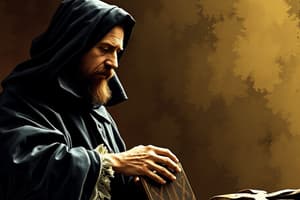Podcast
Questions and Answers
Discuss the irony of the witches' statement that 'Something wicked this way comes'.
Discuss the irony of the witches' statement that 'Something wicked this way comes'.
The irony lies in the fact that Macbeth, who is wicked, enters immediately after the second witch's declaration.
What further evidence is there in this scene that Macbeth has become totally wicked?
What further evidence is there in this scene that Macbeth has become totally wicked?
Macbeth's subsequent actions and decisions reflect his complete moral decline.
What vile ingredients are mentioned in the witches' cauldron?
What vile ingredients are mentioned in the witches' cauldron?
Ingredients include a toad under a cold rock, slice of swamp snake, newt's eye, frog's tongue, fur from a bat, and dog's tongue.
What are the Apparitions?
What are the Apparitions?
What is the message of the Apparitions?
What is the message of the Apparitions?
How does Macbeth react to the Apparitions?
How does Macbeth react to the Apparitions?
What does the last apparition indicate?
What does the last apparition indicate?
Explain the irony in Macbeth's lines: 'Infected be the air whereon they ride, and damned all those that trust them!'
Explain the irony in Macbeth's lines: 'Infected be the air whereon they ride, and damned all those that trust them!'
What message does Lennox bring Macbeth?
What message does Lennox bring Macbeth?
What does Macbeth's final speech reveal about his degeneration of character?
What does Macbeth's final speech reveal about his degeneration of character?
Was Macduff justified in leaving his family in Scotland? Give both sides of this.
Was Macduff justified in leaving his family in Scotland? Give both sides of this.
What dramatic purpose is served by the short scene between Lady Macduff and her son?
What dramatic purpose is served by the short scene between Lady Macduff and her son?
In what significant ways does the murder of Macduff's family differ from Macbeth's previous crimes?
In what significant ways does the murder of Macduff's family differ from Macbeth's previous crimes?
What warning does the messenger bring to Lady Macduff?
What warning does the messenger bring to Lady Macduff?
What happens at the end of scene 2?
What happens at the end of scene 2?
If Macduff is planning to...
If Macduff is planning to...
Flashcards are hidden until you start studying
Study Notes
Irony of the Witches
- Witches describe Macbeth as "something wicked," highlighting their awareness of his corruption.
- Dramatic irony exists as the audience knows Macbeth's wickedness, while he remains oblivious.
Macbeth's Wickedness
- Evidence of Macbeth's total moral decline is found in his increasing willingness to commit atrocities without hesitation.
Witches' Cauldron Ingredients
- Ingredients symbolize vileness and repulsion: toad, swamp snake, newt's eye, frog's tongue, bat fur, dog tongue.
- Similarity to modern-day disgusting items could enhance the grotesque nature of their incantation.
The Apparitions
- First apparition: Warns Macbeth to beware Macduff.
- Second apparition: Encourages Macbeth to be bold; no one born of a woman can harm him.
- Third apparition: Macbeth will not be defeated until Birnam Wood moves to Dunsinane.
Messages of the Apparitions
- Apparitions imbue false confidence in Macbeth, misleading him about the inevitability of his downfall.
Macbeth's Reaction to the Apparitions
- Initially thankful for the advice but reveals his growing paranoia by planning to kill Macduff.
- Macbeth gains a false sense of security, believing he is invincible against threats.
Last Apparition's Indication
- Last apparition signifies that Banquo's descendants will inherit the throne, indicating Macbeth's lineage will not continue.
Irony in Trusting Witches
- Macbeth curses the air they ride upon, recognizing their malevolence yet ironically having placed his trust in them.
Lennox's Message
- Lennox informs Macbeth that Macduff has fled to England, revealing a shift in loyalty and strategy against Macbeth.
Degeneration of Macbeth's Character
- Macbeth's final speech reflects his impulsivity and moral decay; he no longer hesitates to murder.
- Contrast to his earlier reluctance to kill Duncan, signaling a complete loss of humanity.
Macduff's Justification for Leaving Family
- Arguments for justification involve understanding the dangers he faces and prioritizing the greater good.
- Arguments against highlight his failure to protect his family.
Dramatic Purpose of Lady Macduff and Son Scene
- Scene contrasts Lady Macbeth’s character; Lady Macduff embodies maternal qualities.
- Highlights Macbeth's coldness as he orders the murder of innocent lives, showcasing his descent into tyranny.
Significance of Killing Macduff's Family
- Killing innocent family members contrasts with Macbeth's earlier targeted murders, showing a shift towards senseless brutality.
- Reflects a deeper moral collapse, with actions devoid of ambition or honor.
Lady Macduff's Warning
- Messenger warns Lady Macduff about impending danger, indicating a threat to her safety and the need to act.
End of Scene 2 Events
- Murderers arrive seeking Macduff; they fail to find him and instead kill his son, marking a tragic turn in the play.
Studying That Suits You
Use AI to generate personalized quizzes and flashcards to suit your learning preferences.




